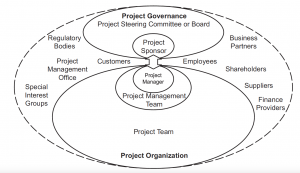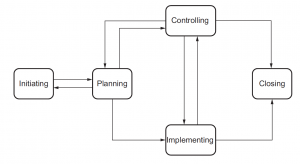1. Definition: project team
Before a project starts the project manager must make sure the project-team, project goals, objectives, scope, risks, issues, budget, timescale and approach have been defined. This must be communicated to all the stakeholders to get their agreement. Any differences of opinion need to be resolved before work starts.

2. Initiation
This is perhaps the most important stage of any project as it sets the terms of reference within which the project will be run. If this is not done well, the project will have a high likelihood of failure. The initiation stage is where the business case is declared, scope of the project decided and stakeholder expectations set. Time spent on planning, refining the business case and communicating the expected benefits will help increase the likelihood of success. It is tempting to start working quickly, but a poor initiation stage often leads to problems and even failure.
3. Planning
The key to a successful project is in the planning. Creating a project plan is the first task you should do when undertaking any project. Often project planning is ignored in favour of getting on with the work. However, many people fail to realise the value of a project plan in saving time, money and many other problems.

4. Execution
Doing the work to deliver the product, service or wanted result. Most of the work related to the project is realised at this stage and needs complete attention from the project manager.


5. Monitoring and Control
Once the project is running it is important the project manager keeps control. This is achieved by regular reporting of issues, risks, progress and the constant checking of the business case to ensure that expected benefits will be delivered and are still valid. A project that is not controlled is out of control.


6. Clousure
Often neglected, it is important to ensure a project is closed properly. Many projects never end because there is no formal sign-off. It is important to get the customers agreement that a project has ended and no more work will be carried out. Once closed, the project manager should review the project and record the good and bad points, so successes can be repeated and failures avoided. A project that is not closed will continue to consume resources.





